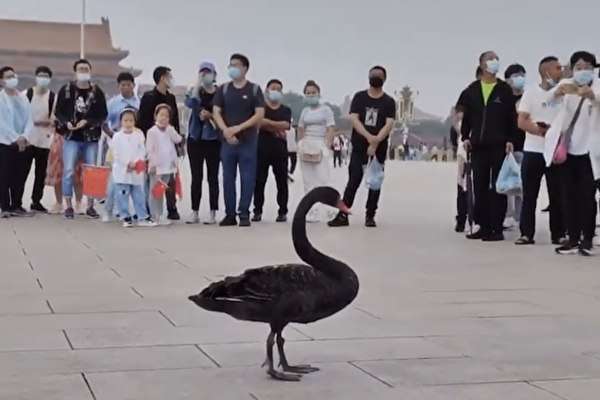The “visit” by a black swan to Beijing’s Tiananmen Square in the morning of Sept. 5 was quickly hushed by Chinese police at the scene, who drove away onlookers as wildlife protection staff caught the bird.
However, the “Tiananmen black swan incident” trended on the Chinese internet, where many took the swan’s appearance as either an amusing coincidence, or an ill omen for the Chinese Communist Party (CCP) regime.
The term “black swan” is often associated with the axiom “Black Swan Event,” coined by statistician Nassim Nicholas Taleb, which describes an unforeseen (and seemingly unpredictable) development with major consequences. The term has been used by Chinese leader Xi Jinping in warnings against events that could threaten the 100-year-old Party’s longevity.
According to state-run “Beijing Daily,” the black swan suddenly landed on Tiananmen Square shortly after the flag-raising ceremony that day. It strolled around the square, pausing to preen its feathers from time to time, in no hurry to fly away.
The swan, appearing “well-travelled” due to its unhurried and undisturbed demeanor, attracted crowds who took its photos. However, security staff at Tiananmen Square went into action, evacuating onlookers and contacting the relevant departments.
Success
You are now signed up for our newsletter
Success
Check your email to complete sign up
At 8 a.m, the black swan was taken away by the Animal Protection Department and sent to Shunyi District. Local media and netizens speculated that the bird may have flown in from a nearby park.
Tiananmen Square is located in front of the Forbidden City palace that once housed the Chinese emperors, and near Zhongnanhai, headquarters of the CCP.
‘Wild birds entering a temple’
Netizens joked and speculated about the “black swan event” on Tiananmen, linking it to recent political developments in China and the fate of the communist authorities.
Chinese regime censors quickly deleted conversations surrounding the black swan in Tiananmen.
Some likened the bird’s appearance to the ancient Chinese proverb “wild birds entering a temple” (野鳥入廟), which is used to describe an imperial dynasty in the period right before its collapse.
Netizens drew a link with the black swan walking around the Monument to the People’s Heroes and the “temple,” which in ancient tradition was a place where the emperor made offerings to heaven or held important discussions.
Likewise, CCP leaders offer wreaths to deceased “heroes” of the Communist Party on the dates of revolutionary events.
One Chinese internet user remarked that Xi Jinping had this January told officials to prevent “black swan” and “grey rhino” incidents, with the latter referring to known risks that could “charge” at any movement (i.e. disasters waiting to happen).
Recently, the Chinese Communist Party’s Cyberspace Administration of China also launched a campaign to clean up online media personalities for “illegally publishing” financial news, as well as prohibiting financial media channels from “bad-mouthing” China’s financial market and China’s economy.
“As soon as these were said, the black swan landed on Tiananmen Square,” another netizen commented. “It seems that sudden economic collapse may happen in a matter of minutes, and the biggest uncertainty comes from Beijing and from the political center.”
Others noted that on Sept. 2, the CCP had just announced that it would establish the Beijing Stock Exchange (BSE). “The [black swan] picked a fine time indeed,” one person wrote.
By Crystal Fang and Leo Timm.














